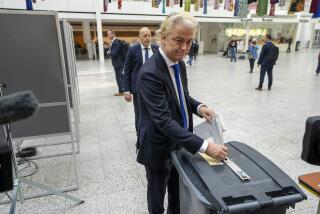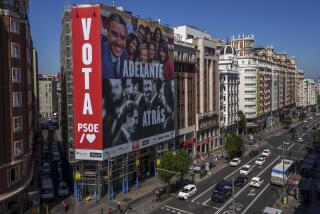Spain Seeks to Drum Up Interest in Its Trailblazing Vote on a Europe Constitution
- Share via
MADRID — Stars from the Spanish rock scene, the soccer field and even outer space peer from television sets with messages aimed at stirring Spain’s civic spirit.
Thousands of cans of a fizzy energy drink called Referendum Plus are being distributed for free, decorated with refrains telling voters to vote yes, vote no -- just vote.
For the record:
12:00 a.m. Feb. 23, 2005 For The Record
Los Angeles Times Wednesday February 23, 2005 Home Edition Main News Part A Page 2 National Desk 1 inches; 52 words Type of Material: Correction
EU vote -- An article in Saturday’s Section A said Spain could become, with its vote the next day, the first country to ratify the European Union constitution. The parliaments of Lithuania, Hungary and Slovenia had already approved the document; Spain was the first nation to put the constitution before voters nationwide.
The gimmicks are part of a $9-million promotional campaign aimed at rallying people to the polls Sunday, when Spain becomes the first country in the European Union to vote on the continent’s new constitution.
It is not much of a contest. Polls indicate that Spaniards decisively favor acceptance of the document.
But the vote could give an important psychological boost to other European countries that will be watching Spain’s exercise, and it will be seen as a political test for the Socialist government of Spanish Prime Minister Jose Luis Rodriguez Zapatero.
The 465-article charter is considered a defining document for the emerging 25-nation bloc -- the United States of Europe, as some have called it. It establishes a foreign minister post and full presidency, ending the current rotating position. It also simplifies lawmaking procedures.
For Spain, becoming the first nation to ratify the constitution would help validate its climb from a sleepy backwater that came to democracy only after decades of fascist dictatorship -- a point Zapatero stresses at rallies and in speeches. Spain has received about $220 billion in subsidies since joining the EU in 1986, and its economy has grown steadily.
Two of every five miles of roadway built in Spain since the country gained membership were financed with EU money, Zapatero often mentions as part of his vote-yes campaign.
“Europe has helped Spain a lot, and that’s why we want to be the first to return that help ... in a referendum,” he told supporters this month.
With its political prestige at stake, the government’s biggest worry is that the turnout Sunday will be embarrassingly low. The EU Constitution doesn’t exactly make for scintillating reading, and its mention is often greeted with yawning apathy.
Hence the gimmicks. Soccer stars such as Emilio Butragueno of Real Madrid and Spanish astronaut Pedro Duque, who has flown two space missions, have appeared in TV ads reciting portions of the document. The referendum has been promoted at games, and a group of dancers at a concert performed a flamenco version of the EU’s anthem, Beethoven’s “Ode to Joy.”
Researcher Jose Ignacio Torreblanca, in a study for the Real Instituto Elcano, a Madrid think tank, warned that confusion could suppress turnout.
“Any participation lower than 50% would open numerous questions over whether this is the European Constitution that satisfies the natural and instinctive Europeanism of the Spanish people,” he said.
Antonio Maestre, a 27-year-old graphic arts student in Madrid, said he felt uninspired and uninformed.
“I don’t see what my vote would be good for,” he said. “Part of it is I don’t have much interest, but I haven’t seen much information about it, either.”
Most of Spain’s major political parties, on both the left and right, are encouraging citizens to vote in favor of the charter.
“I’m voting yes, for reasons of pragmatism,” said Ricardo Calvo, a 54-year-old retired bank employee. “In 2,000 years we’ve never agreed on anything. The European Union is the only way to mix European cultures and to overcome nationalisms.... The constitution treaty is Europe’s salvation.”
In a sign of interest from other European countries, where supporters of the constitution are expected to have a tougher time, French President Jacques Chirac and German Chancellor Gerhard Schroeder have visited Spain to join Zapatero at vote-yes rallies.
The charter, which was years in the drafting, was signed in October by the leaders of the EU, which grew from 10 to 25 members last year. Each country must ratify the document for it to go into effect, a process that could take two more years.
*
Special correspondent Mateo-Yanguas reported from Madrid and staff writer Wilkinson from Rome.
More to Read
Sign up for Essential California
The most important California stories and recommendations in your inbox every morning.
You may occasionally receive promotional content from the Los Angeles Times.














